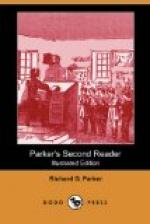3. A kind friend, who was going to the West Indies, in a vessel of his own, very generously offered to take me with him, and I gratefully accepted the offer.
4. We sailed from Boston early one morning, and were soon out of sight of the land. I was quite ill during the voyage; but fortunately the voyage was a short one, and we reached the place of our destination on the fourteenth day after we sailed.
5. The island, where we landed, was a beautiful spot; and lemons, oranges, pine-apples, and many other delicious fruits, were growing out in the open air.
6. The people who lived on this island did not speak the English language; and the family with whom I was to reside could speak only in French.
7. I observed, at dinner-time, that some of the persons at the table held out their tumblers to the servant, and said something which sounded to me like O.
8. I often heard this word; and every time it was spoken, water was brought, or poured out, or something was done with water.
9. I then made up my mind that this word that I thought was O meant water; and I found out afterwards that I was right, except that I did not spell it right.
10. This I discovered by means of the Bible, from which the family used to read.
11. It was a very large one, with very large letters; and as I was very fond of hearing them read, and of looking over the book while some one was reading aloud, I noticed that whenever the reader came to the letters e, a, u, he called them O; and thus I found out that water, in their language, was called O, but was spelt e, a, u.
12. In the same manner, I found out the words, or names, which they gave to bread, and sugar, and butter, and meat, and figs, and oranges, and lemons, and pine-apples.
13. And now, perhaps, you may be able to find out how the little Spanish girl, mentioned in the last lesson, learned the meaning of English words that she had never heard until she came to live in the family where nothing but English was spoken.
14. She was obliged to listen, when any one spoke, and watch to see what was wanted; and in the same manner in which I found out the meaning of O, and what to call bread, and sugar, and butter, and meat, and figs, and oranges, and other fruits, she learned to call things by their English names.
15. But, in order to do this, she was obliged to listen very attentively, to try to remember every new name that she learned; and, by so doing, in less than a year she could talk almost as plainly as any one in the house.
16. It was very easy for her to learn the names of things, because she heard them spoken very often. Such words as chair, table, water, sugar, cake, potato, pudding, and other words which are the names of things she could see, she learned very quickly.
17. But such words as come and go, or run and walk, and the little words to and from, and over and under, or such words as quickly and slowly, and many other words of the same kind, she could not learn so easily.




